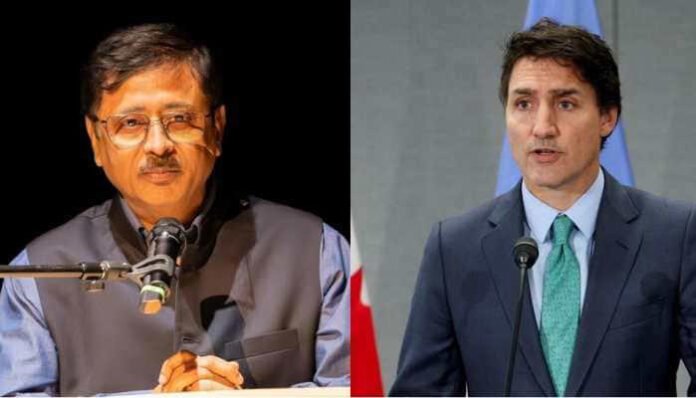Tensions between India and Canada have escalated further in the ongoing diplomatic dispute following the killing of Hardeep Singh Nijjar, a prominent Sikh separatist leader in Canada. Sanjay Verma, India’s recalled High Commissioner to Canada, has made sharp remarks about the actions and conduct of the Canadian government under Prime Minister Justin Trudeau, accusing it of mishandling the situation and allowing extremist elements to thrive. Verma’s comments have intensified the already strained relations between the two nations, highlighting the deepening divide over the Nijjar controversy.
The Background: Nijjar’s Killing and Diplomatic Fallout
The row centers around the killing of Hardeep Singh Nijjar, a pro-Khalistan Sikh leader in Canada who was shot dead outside a gurdwara in Surrey, British Columbia, in June 2023. Nijjar was an outspoken advocate for the creation of an independent Sikh state, Khalistan, and had long been a figure of controversy in India, where the government had accused him of being a terrorist involved in violent activities.
India’s involvement in Nijjar’s killing has been a source of speculation, with Canadian Prime Minister Justin Trudeau accusing India of playing a role in the assassination on Canadian soil. Trudeau’s claims, made publicly in September 2023, triggered a diplomatic crisis between the two nations. India has vehemently denied any involvement in Nijjar’s death, calling Trudeau’s accusations “absurd” and “unsubstantiated.”
Following Trudeau’s allegations, both countries expelled diplomats, and relations have been fraught ever since. India’s recall of its High Commissioner to Canada, Sanjay Verma, was seen as part of this diplomatic deterioration.
Sanjay Verma’s Criticism of the Trudeau Government
In a recent interview after being recalled, Sanjay Verma exposed what he described as the Trudeau government’s failure to manage the growing presence of extremist groups in Canada, particularly those advocating for Khalistan. According to Verma, the Trudeau administration has allowed these groups to operate freely under the guise of freedom of expression and political activism, even as they promote violence and separatism.
“The current Canadian government, under Justin Trudeau, has been lenient towards extremist elements that openly call for the disintegration of a sovereign nation like India,” Verma said. He further added that the activities of pro-Khalistan groups in Canada, including hate speech, glorification of violence, and the incitement of anti-India sentiments, have been left unchecked. “This creates a dangerous environment, not only for India but for the broader peace and stability of the region,” Verma argued.
He accused the Trudeau government of using the Khalistan issue for political gains, particularly in areas of Canada where there is a significant Sikh population. Verma’s remarks suggested that Trudeau’s stance on Nijjar’s killing was driven by domestic political considerations rather than genuine concern for justice or diplomatic principles. He also implied that Trudeau’s public accusation against India was an attempt to appease a vocal segment of his political base, rather than based on credible evidence.
Canada’s Response and Justification
Canada, on the other hand, has defended its actions, with Trudeau maintaining that the accusations against India were based on credible intelligence and that the country’s legal institutions were pursuing the case in accordance with Canadian laws. Canada has also reiterated its commitment to protecting the rights of its citizens to engage in political expression, including those advocating for Khalistan, as long as they do not incite violence.
Trudeau has repeatedly stated that his government is committed to holding those responsible for Nijjar’s death accountable, but insists that the rule of law must prevail in Canada. While Canada acknowledges the long-standing tension over the Khalistan issue, it views the rights of its citizens, including the Sikh community, as paramount.
Rising Tensions Between India and Canada
Sanjay Verma’s comments have reignited debates about the Trudeau government’s policies toward extremist groups in Canada, and the Indian government has used this opportunity to further its claims that Canada is sheltering terrorists under the cover of free speech. Verma’s remarks also come at a time when India has been ramping up pressure on Western countries to crack down on Khalistani elements abroad, which New Delhi sees as a direct threat to its national security.
The diplomatic fallout has led to a further cooling of relations between the two countries, with trade talks suspended and high-level meetings canceled. India has also issued advisories warning Indian nationals to be cautious while traveling in Canada, citing an increase in anti-India activities.
Broader Implications for India-Canada Relations
The Nijjar row and the subsequent diplomatic crisis have far-reaching implications for India-Canada relations. Canada has historically been home to a large and vibrant Sikh diaspora, with many individuals involved in both political and economic life. However, the recent friction over the Khalistan issue has created a wedge between the two countries, making it difficult to return to normalcy in the near future.
Sanjay Verma’s sharp criticism of Trudeau’s government highlights the growing mistrust between India and Canada. For India, the presence of pro-Khalistan elements in Canada is seen as a direct threat to its territorial integrity. For Canada, the right of its citizens to express political opinions, no matter how controversial, is a cornerstone of its democratic values.
As both sides dig in their heels, the Nijjar row has become more than just a bilateral dispute—it is now a symbol of the broader challenge of balancing national security concerns with civil liberties in a globalized world.
Sanjay Verma’s pointed remarks about the Trudeau government’s handling of extremist groups in Canada have deepened the rift between the two countries. As the Nijjar row continues to unfold, it is clear that the diplomatic, political, and security ramifications will be felt for a long time, with both nations grappling to find a path forward in their strained relationship.

